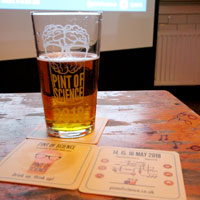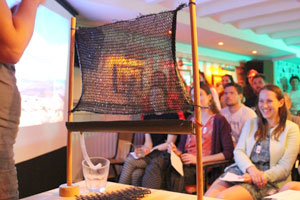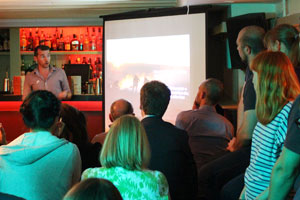 Pint of Science is an annual international festival spread over three evenings that aims to promote interaction between academic researchers and members of the public in a casual setting.
Pint of Science is an annual international festival spread over three evenings that aims to promote interaction between academic researchers and members of the public in a casual setting.
This year the festival took place in 21 different countries and across 300 different cities on 14, 15 and 16 May.
King’s Geography has proudly provided support and funding for Pint of Science events in London for the fifth year running. Due to the interdisciplinary nature of its research, the department contributed to two of the six King’s events; ‘Planet Earth’ and ‘Our Society’.
The Planet Earth events were organised by Geography PhD students: Eleanore Heasley, Hannah Nguyen, Nathalie Richards, Alois Tilloy, Mark de Jong, and Anna Turbelin.
Events were highly successful, with speakers entertaining a full house on all three nights of the festival. We were also pleased to discover from a quick show of hands that more than 80 % of the audience came from non-academic or non-scientific backgrounds – a fantastic out-reach achievement!
Planet Earth
This year, the Planet Earth events took place at the cosy Simmons bar in Kings Cross.
 Monday night’s “Unlocking Nature’s Mysteries” event featured talks from Dan Schillereff, Tom Dowling and Tianran Zhang, highlighting how cutting-edge research using sediment cores, machine learning and satellite observations are helping to answer key questions about our planet.
Monday night’s “Unlocking Nature’s Mysteries” event featured talks from Dan Schillereff, Tom Dowling and Tianran Zhang, highlighting how cutting-edge research using sediment cores, machine learning and satellite observations are helping to answer key questions about our planet.
On Tuesday, Arnout van Soesbergen and Rebecca Farnum attempted to answer the question “Nature; what is it good for?”. Arnout highlighted how bringing different communities together can help us to produce more realistic scenarios for ecosystem modelling, and Rebecca demonstrated how innovative spider web-inspired technology can transform community access to water.

The final night saw Paul Breeze and James Millington explore humanity’s “Paths to world domination”. Paul took us on a journey through time, explaining how the recent discovery of the ‘middle finger’ is helping to unlock the mysteries of human civilisation. Afterwards, James (daringly!) wowed the audience with a live demonstration of agent-based modelling, highlighting how this powerful technique can help us study emergent behaviour and better understand complex systems.